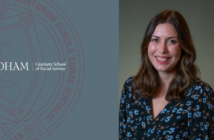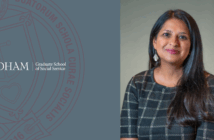Dr. Lakeia Murray’s journey into social work was shaped by the challenging realities of her childhood and her environment growing up. Raised by her great-grandmother, who was the anchor of the family, Dr. Murray was exposed to a family member who battled drug addiction and alcoholism, which introduced her to the impact addiction can have on individuals and families.
“I knew I wanted to grow up and work with individuals and help them overcome their struggles, based on what I saw as a young kid,” she said.
After finishing high school, Murray decided to pursue a career dedicated to supporting those facing mental health challenges, addiction, and trauma. Initially, this path led her toward psychology, but Murray soon realized that her passion extended beyond understanding the cognitive processes of the brain. She wanted greater career breadth, and to work hands-on with people and their environments. Social work offered the type of engagement Murray sought.
“I wanted to help more people and not just focus on the brain,” she said.
From Case Worker to Clinical Professor
Murray’s social work career trajectory has been marked by significant milestones and varied roles, including stints in child welfare, healthcare integration, and private practice. In each position, Murray advocated to address unseen and unspoken issues—including alarming instances of human trafficking.
“I saw a lot of people who were being trafficked, and that… motivated me to kind of keep pushing… to help individuals,” she said.
Murray later pursued doctoral education and continued to grow her skill set. Her goal was clear: to equip future social workers with the tools and skills she felt were missing in her early career. This amplified her impact—she could now teach classrooms full of students as they set out into the workforce.
One of Murray’s most passionate beliefs is that the intangible skills needed for social work are often learned through real-world experience, not textbooks. She acknowledged that the evolving nature of trauma—like human trafficking and domestic violence—often outpaces academic materials. For her, it’s critical for students to stay informed about these issues and remain adaptable—and couple that with the theory they learn in the classroom.
“What’s not in a textbook is knowing individuals’ backgrounds, knowing their environments, understanding their culture,” she said. “Some textbooks do not reflect that.”
Beyond her wealth of experience and knowledge, Murray brings a deeply personal connection to her teaching. As a woman of color who navigated through a difficult upbringing, she relates to many students who have faced similar challenges.
“It doesn’t matter where you come from, you can still make something out of yourself,” she said.
Murray’s relatability is not just a teaching tool but a source of empowerment.
Welcome to the Ramily!
Growing up, Murray said she would ride the 12 bus past Fordham’s Bronx campus, dreaming of one day being part of the institution. As she steps into the Clinical Assistant Professor role, she enters her first faculty position. At Fordham, Murray said she has found her professional home.
“It goes back to my childhood, just always loving Fordham University… it’s somewhere where I want to grow,” she said.
Now, Murray is committed to helping her students succeed by bridging the gap between academic theory and the often unpredictable realities of the field.
“I want to make sure that my students gain what they need to be successful in the field,” she said.
Murray’s vision for the future of social work is expansive. She foresees the continued growth of the profession, particularly in response to the increasing demand for mental health services in the aftermath of the COVID-19 pandemic. Looking ahead, she predicts that social work will incorporate emerging areas like artificial intelligence and address topics that have historically been underrepresented in curricula, such as human trafficking and eating disorders. In her words, “Prepare yourself to be a leader in the field 15 years from now.”



